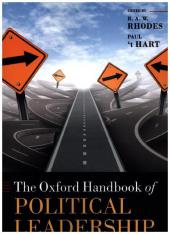 Neuerscheinungen 2016Stand: 2020-02-01 |
Schnellsuche
ISBN/Stichwort/Autor
|
Herderstraße 10
10625 Berlin
Tel.: 030 315 714 16
Fax 030 315 714 14
info@buchspektrum.de |

R. A. W. Rhodes
The Oxford Handbook of Political Leadership
Herausgegeben von Rhodes, R. A. W.; ´t Hart, Paul
2016. 798 S. 244 mm
Verlag/Jahr: OXFORD UNIVERSITY PRESS; OUP OXFORD 2016
ISBN: 0-19-877851-1 (0198778511)
Neue ISBN: 978-0-19-877851-6 (9780198778516)
Preis und Lieferzeit: Bitte klicken
Political leadership has returned to the forefront of research in political science in recent years, after several years of neglect. This Handbook provides a broad-ranging and cohesive examination of the study of political leadership.
Political leadership has made a comeback. It was studied intensively not only by political scientists but also by political sociologists and psychologists, Sovietologists, political anthropologists, and by scholars in comparative and development studies from the 1940s to the 1970s. Thereafter, the field lost its way with the rise of structuralism, neo-institutionalism, and rational choice approaches to the study of politics, government, and governance. Recently,
however, students of politics have returned to studying the role of individual leaders and the exercise of leadership to explain political outcomes. The list of topics is nigh endless: elections, conflict management, public policy, government popularity, development, governance networks, and regional
integration. In the media age, leaders are presented and stage-managed-spun-DDLas the solution to almost every social problem. Through the mass media and the Internet, citizens and professional observers follow the rise, impact, and fall of senior political officeholders at closer quarters than ever before.
This Handbook encapsulates the resurgence by asking, where are we today? It orders the multidisciplinary field by identifying the distinct and distinctive contributions of the disciplines. It meets the urgent need to take stock. It brings together scholars from around the world, encouraging a comparative perspective, to provide a comprehensive coverage of all the major disciplines, methods, and regions. It showcases both the normative and empirical traditions in political leadership
studies, and juxtaposes behavioural, institutional, and interpretive approaches. It covers formal, office-based as well as informal, emergent political leadership, and in both democratic and undemocratic polities.
The book is written in a smooth but nonetheless rigorous way, and even non-specialists of particular disciplines can fruitfully read all the chapters ... everyone who wants to approach the topic for one reason or another will find an extremely rich picture of the state of the art and an outstanding source of information, thought-provoking debates, and suggestions for further studies. In sum, the editors have packaged together a piece which is well worth reading and which succeeds in answering the question posed. Michelangelo Vercesi, Leuphana University Lüneburg, Political Studies Review


